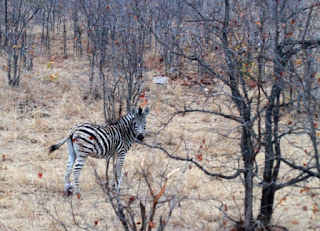Travelling and reading are suppose to broaden a persons understanding and experience.
As the date of my departure drew closer I decided I needed to increase my knowledge of Africa.
My first port of call were the travel books such as;

The eagle eyed among you will notice this is its second appearance as "Read of the Month".
I flagged it up as the October 2019 Read having just read the first couple of chapters.
I have now finished it.
It is not an easy or uplifting read.
It really needs a health and safety warning;
contains descriptions of gross human violence and destroys any concept of goodness overpowering evil.
No one comes out well.
All succumb to greed and self interest including we in the West, the UN and the various charities. It is hypocritical to think that we know best and would do things differently.
The book also illustrates the fragility of democracy.
How easily it can be circumvented.
No one can afford to be complacent
And in today' s current climate in the UK it is a timely reminder that ordinary people do have the power to change things if they have the will and voting is an important way to exercise that power.
So please everyone who gets as far as this please
 |
| Read of the Month Sept 2019 |
As the date of my departure drew closer I decided I needed to increase my knowledge of Africa.
My first port of call were the travel books such as;
- Lonely Planet,
- DK Eyewitness,
- Rough Guide. etc
These were very interesting as they gave a lot of information about the physical geography of places (where and what to see etc) A good place to start but not very much about the "essence" of a place or country.
In my experience wandering around and talking to local people is essential to gleaning the "essence" of places. Having a dog with you greatly facilitates this.
I wanted to know more about not only the continent but also about the many different countries of Africa. There are in fact some 44 countries. (New to me!)

I was especailly interested in Botswana and Namibia as I would be travelling through them and knew almost nothing about them.
My only knowledge of Botswana was from the novels by
Alexander McCall Smith "
Ladies No 1 Detective Agency"
(Not Read of the Month but a good read nonetheless)
Then I found a book somewhere (senior moment; don't remember where) that was
- recent; published (2005)
- comprehensive (20 pages of index)
- evidenced based (18 pages of chapter notes; 27 pages of bibliography)
which I found hugely informative and influential.
The State of Africa
by
Martin Meredith
History of 50 years of independence
I flagged it up as the October 2019 Read having just read the first couple of chapters.
I have now finished it.
It is not an easy or uplifting read.
It really needs a health and safety warning;
contains descriptions of gross human violence and destroys any concept of goodness overpowering evil.
No one comes out well.
All succumb to greed and self interest including we in the West, the UN and the various charities. It is hypocritical to think that we know best and would do things differently.
The book also illustrates the fragility of democracy.
How easily it can be circumvented.
No one can afford to be complacent
And in today' s current climate in the UK it is a timely reminder that ordinary people do have the power to change things if they have the will and voting is an important way to exercise that power.
So please everyone who gets as far as this please
- register to vote
- vote.
If you do not know who to vote for DO NOT stay at home.
Go and vote but spoil the ballot paper. (One way this can be done is to tick all the boxes)
Why should you do this?
Every returning officer announces the number of votes each candidate gets.
At the very end they announce the number of spoiled ballot papers.
Imagine what would happen if there were thousands of spoiled ballot papers in each constituency rather than the hundred or so at present.





























